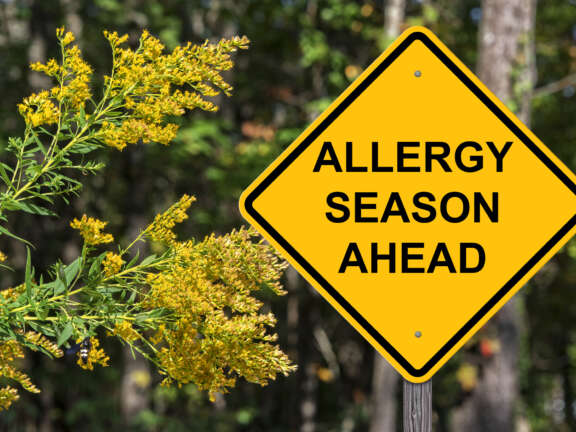How to Relieve Seasonal Allergies


As the seasons change, you may suffer from sneezing, a scratchy throat, or itchy, watery eyes. Seasonal allergies, or hay fever, can make a beautiful spring day or fall afternoon miserable.
But you don’t have to suffer every time the weather changes.
Understanding the causes of seasonal allergies and what you can do to prevent or treat them can help you enjoy each season to the fullest.
Causes of Seasonal Allergies
One-quarter of U.S. adults and nearly one in five children have seasonal allergies. Allergens are the culprit. Commonly found in nature, allergens trigger an overactive immune response. The most common triggers of seasonal allergies include:
- Pollen—tiny grains released into the air by trees, grasses, and weeds to fertilize other plants—are the main cause of seasonal allergies. Inhaling the pollen can trigger an intense allergic response in some people.
- Dust mites are microscopic insects that feed on dead skin cells. They live anywhere humans live. Dust mites are present year-round, but their populations can surge during warmer months. Exposure to dust mite droppings and parts of the mites themselves can lead to allergic symptoms.
- Mold spores—cells that lead to mold production—thrive in damp and humid conditions. Concentrations of mold spores tend to rise during the spring and fall. Inhaling mold spores can cause allergic reactions.
Recognizing Allergy Symptoms
Recognizing seasonal allergy symptoms can help you find the proper treatment. Common allergy symptoms include:
- Coughing: Seasonal allergies can cause persistent coughing, often accompanied by throat irritation.
- Fatigue: Allergies can affect your energy levels and leave you feeling overly tired and drained.
- Itchy or watery eyes: Seasonal allergies can cause irritation, redness, and a persistent itchy sensation in the eyes.
- Runny or stuffy nose: Pollen triggers the release of histamines, chemicals found inside your cells. Histamine release can lead to classic allergy symptoms like a runny or stuffy nose and congestion.
- Sneezing: Frequent and uncontrollable sneezing is a common symptom of seasonal allergies.
It’s easy to confuse seasonal allergies with other conditions. The common cold, for example, can also lead to coughing, tiredness, and a runny nose. However, most colds or other illnesses last a few days to a week. Seasonal allergies can last months.
Preventing Seasonal Allergies
To manage seasonal allergies, you need to take steps to reduce exposure to allergens. Some effective prevention options include:
- Avoid allergy triggers. You can minimize exposure to allergens by staying indoors during peak pollen times, closing your windows, and using air purifiers to reduce indoor pollen levels. You can also reduce exposure to allergens in your home by using an allergen-proof mattress cover and vacuuming often.
- Rinse allergies away. Allergens can get stuck in your nasal cavities. You can flush allergens and relieve congestion with a Neti pot or saline nasal spray. The Food and Drug Administration (FDA) says Neti pots can work well for allergies when used correctly.
Treating Seasonal Allergies
Prevention may not be enough for some people with seasonal allergies. If you can’t manage your allergy symptoms with simple lifestyle changes, you may need medical treatment.
Over-the-Counter Medications
Most allergy sufferers get quick temporary symptom relief with over-the-counter allergy medications. You can choose from three options based on your symptoms:
- Antihistamines: These medications block histamine, the chemical released during allergic reactions.
- Corticosteroids: These sprays reduce inflammation in the nasal passages and can provide allergy relief.
- Decongestants: These medications help reduce congestion by narrowing blood vessels in the nasal cavity.
Over-the-counter allergy medications do have some drawbacks. They can cause drowsiness and dry mouth. Talk with your provider about the side effects of over-the-counter allergy medications and other allergy relief options.
Prescription Allergy Medications
If you have severe seasonal allergies, your provider may recommend prescription medications like more potent antihistamines and corticosteroids. Allergy shots are another option.
A type of immunotherapy, allergy shots gradually expose you to increasing amounts of allergens. This exposure helps you to build tolerance and can change your body’s immune response to allergens you encounter in nature.
Prescription allergy medications can have unpleasant side effects and require careful monitoring by a health care professional. Talk with your provider about your allergy prescription options.
Natural Allergy Remedies
Some people with seasonal allergies may find relief in natural or alternative therapies like acupuncture or herbal supplements. Natural remedies include probiotics, honey, and butterbur root.
National Center for Complementary and Integrative Health says that there’s some evidence that certain alternative allergy remedies may be effective. Most are safe to try and may help relieve allergies at least a little bit. Make sure you discuss the use of herbals and supplements with your provider, as some may interact with prescription and over-the-counter drugs.
Breathe Easy this Allergy Season
Allergies can put a damper on your favorite season, but you can find relief. Over-the-counter medications, prescription solutions, and even natural remedies can help you manage your allergies. With the right plan in place, you can breathe easy.
